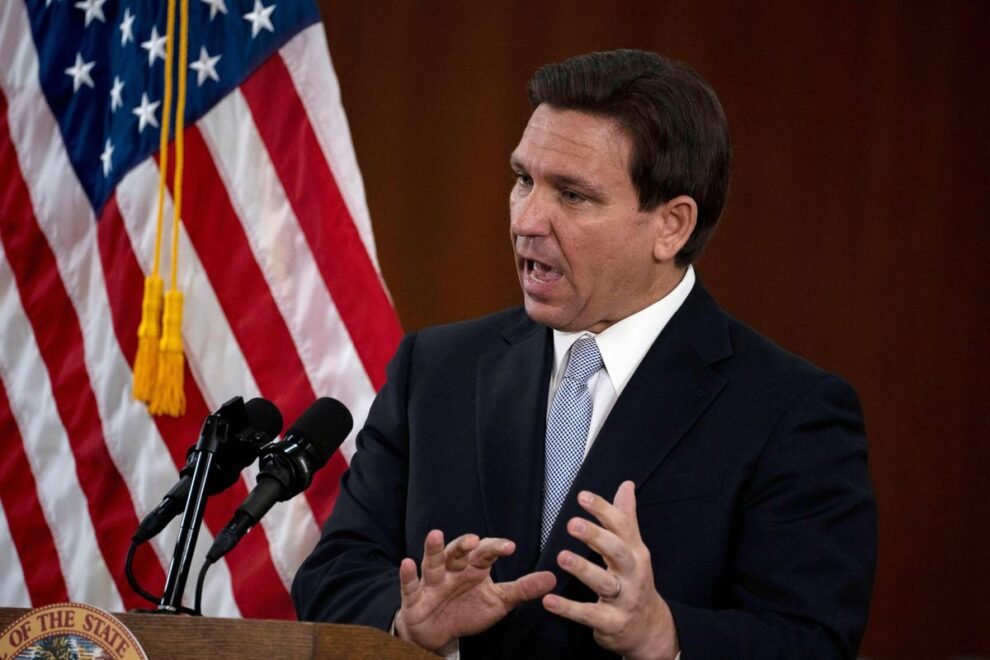In the year-long feud between Florida Gov. Ron DeSantis and Disney, both parties are standing their ground.
What originally began as Disney’s public criticism of Florida’s so-called “Don’t Say Gay” law—which originally barred schools from discussing gender and sexual orientation through the third grade, but was recently expanded to impact students through grade 12—has turned into a series of legal battles and displays of political power.
Disney filed a court case on April 26 against DeSantis and the five-member board that oversees Walt Disney World’s self-government powers, after the governor spent months stripping the company of its special authority— like new constructions without county permission. The First Amendment lawsuit was filed in federal court.
On Friday, DeSantis’ attorney filed a motion to disqualify U.S. District Judge Mark Walker from presiding over the lawsuit. (The judge previously referenced the fight between Disney and DeSantis in two unrelated suits about free speech and fear of retaliation, which the governor’s attorney says brings Walker’s impartiality into question.) The motion came a day after Disney, the state’s largest tax payer, announced that it would no longer construct a billion-dollar office complex that would have brought 2,000 jobs to the area.
DeSantis, who last week said that there is “zero” chance he would be “backing down from” the fight, is set to announce his presidential bid in the coming weeks.
Here’s what to know about the ongoing battle between DeSantis and Disney.
A brief timeline
The feud began in March 2022 when Disney openly criticized the governor for Florida’s Parent Rights in Education Act, or “Don’t Say Gay” law, after Disney’s workers protested against the new legislation.
Amid pressure from his employees, then-Disney CEO Bob Chapek addressed the company’s stance on the matter, saying that Disney was “opposed to the bill from the outset” and did not initially make their stance public because the company felt it would “be more effective working behind the scenes.”
Conflict between DeSantis and Disney became tense, leading the Florida governor to ask state lawmakers to revoke Disney’s self-governing privileges on April 19, 2022. DeSantis signed legislation stripping the company of its special governing and tax jurisdiction just three days later. That law was designed to go into effect beginning June 1, 2023. Because the district held $1 billion in bond debt that taxpayers would have been liable for, a special legislative session in February 2023 allowed Disney to keep their special tax district status, but still exempt them from choosing who can sit on their board.
DeSantis expanded on his control over Disney in February 2023, when state legislators gave him the power to handpick members to the board that oversees Disney World’s government services. The new governor-selected members were appointed on Feb. 27, but before they could take power, previous board members signed a contract that limited the powers of the board to maintaining “roads and basic infrastructure,” board member Ron Peri said, according to the Orlando Sentinel.
“We’re going to have to deal with it and correct it,” board member Brian Aungst Jr. told the Sentinel. “It’s a subversion of the will of the voters and the Legislature and the governor. It completely circumvents the authority of this board to govern.”
Disney filed a suit against DeSantis and his newly-appointed board members in late April, saying that the governor was targeting Disney in a “relentless campaign to weaponize government power against Disney in retaliation for expressing a political viewpoint.”
The new district board then countersued the Orlando company in an attempt to reinstate the board’s powers. Florida lawmakers, however, later passed a law that gave the new board the power to void the contract that made the board powerless. On May 16, Disney asked an Orange County judge to dismiss the countersuit.
What were Disney’s self-governing powers?
In 1967, Florida lawmakers created the Reedy Creek Improvement District (RCID), a local government entity which presides over Walt Disney World and whose purpose was to administer the “economic development and tourism” within its jurisdiction, according to an archived version of the RCID’s website.
The district rules over 25,000 acres in Orange and Osceola counties. Since Walt Disney World owns most of the property in the district, it is responsible for administering public services like fire protection, emergency medical services, water and more to the area, The Hill reports.
Under this special tax status, Disney had the freedom to construct roads and buildings without asking for permission from the county and run as its own county government. RCID board members were previously selected by Disney.
In April 2022, Gov. DeSantis signed into law a rule that sought to dissolve the RCID beginning on June 1, 2023. (A million-dollar bond debt prevented the district from fully being abolished, though the district is still being impacted by other changes). Under that law, the governor renamed the RCID to the Central Florida Tourism Oversight District, with a five-member governor-appointed board. Board members can not have any affiliations to Disney.
What does Disney’s first amendment lawsuit allege?
Disney CEO Bob Iger had long expressed turmoil in the fight against the Sunshine State’s governor, calling his policies “not just anti-Florida but anti-business.” That anger eventually pushed Disney to sue DeSantis and his newly-appointed board members in late April, saying that the governor was targeting Disney in a “relentless campaign to weaponize government power against Disney in retaliation for expressing a political viewpoint.”
The governor’s actions, the lawsuits say, are impacting Disney’s business and economic future, and is a violation of the company’s right to free speech.
DeSantis has repeatedly threatened Disney with retaliation including creating a state prison, state park, or increasing taxes on Walt Disney World.
“They’re gonna live under the same laws as everybody else, they’re gonna pay their fair share of taxes and they’re not gonna govern themselves,” DeSantis said on Friday according to the Hill. “And to put one corporation on a pedestal and let them be exempt from the laws is not good policy. It’s not free market economics, and it’s not something that our state’s gonna be involved in.”
Source : Time












